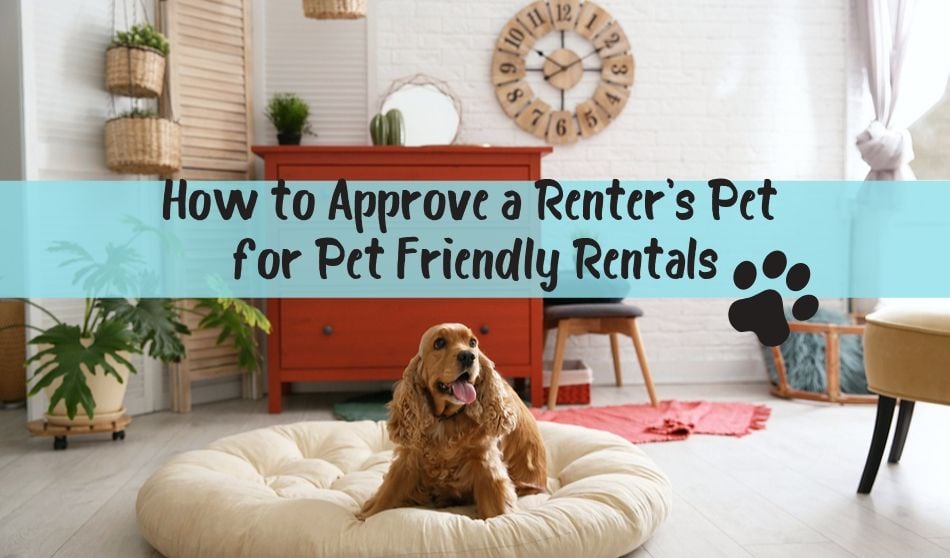
A great tenant can mean the difference from an excellent landlord-tenant relationship and a nightmare situation, and this is why you always screen your tenants before entering into a lease agreement. An experienced landlord or property manager knows that overlooking tenant screening is a rookie mistake. However, even long-term managers or landlords may be neglecting to screen another important resident in their rentals–the four-legged friend kind of resident. Evaluating a pet alongside its owner can protect your property from damage and ensure the safety of other residents in your pet friendly rentals.
Methods to Screen Pets:
Pet Resumes
Evaluating a pet based on a pet resume can be a useful resource. Well-made pet resumes will include vital information such as the pet’s name, breed, age, weight or size, spay or neuter status. Ideally, this applicant-created resume will also include important answers to questions regarding the pet’s vaccination records and if the owner regularly utilizes any medication to keep pests at bay (such as a flea and tick repellent).
Unfortunately, screening based on pet resumes can leave room for error. Self-reporting pet owners applying for a rental will strive to put their pets in the best light possible and may oversell their pet’s merits. Simultaneously, well-meaning rental applicants may inadvertently neglect to list important information related to their pets. Moreover, you or your management team must then manually asses the information and compare it with your current pet policy for disqualifying features such as breed restrictions, etc.
Pet Screening Service
After doing some research, Rentec Direct has found an easier solution for our clients.
Similar to a tenant screening service, pet screening services exist for property managers and landlords to evaluate the qualifications of an applicant’s pet.
You already know that not having a standardized tenant screening policy can put you at risk. Using a third-party resource for your tenant screening and pet screening ensures that you are giving each prospective tenant a fair and standardized application process and risk assessment.
Services like Rentec’s new favorite pet screening provider, PetScreening, now make it possible for landlords and property managers to outsource your renters’ pet risk assessment, taking the burden off of your team and ensuring a fair and efficient application process for your future tenants.
Your rental applicants (tenants) enter important information about their specific pet, including their general care and understanding of pet policies into the database. The platform reviews various factors to analyze housing-related risk; these factors include your community-specific restrictions, such as breed, weight, and age, as well as vaccination records and behaviors.
The end result is a pet profile with a FIDO Score based on pet-specific information. Landlords and property managers can then use this scoring system (in accordance with local and state laws) to establish permittable pet rent, non-refundable fees, or larger pet deposits to cover any additional risk of damage from the pet and its owner. The best part? This process is FREE for landlords and property managers, as your rental applicants will initiate and pay for their pets’ PetScreening.
Using a pet screening service adds an additional layer of liability protection by having a standardized process when dealing with household pets and assistance animals.
Evaluating Assistance Animals and Emotional Support Animals:
In a discussion about renting to pet owners, assistance animals inevitably come up. It is important to note that assistance animals are not considered pets, and assistance animals cannot be subject to pet policies. If a housing provider prohibits pets on the property, a tenant with a qualifying disability may request reasonable accommodations in order for an assistance animal to live there.
While landlords and property managers are legally required to reasonably accommodate to assist those who need them, there are unscrupulous tenants who are willing to submit fraudulent pet certifications to avoid specific pet policies (often breed restrictions). This undermines and puts at-risk those individuals with a legitimate need for service or assistance animals. And while property managers and landlords want to mitigate these cases of fraudulent claims, managers are often hesitant to ask for third-party verification documentation for fear of violating Fair Housing laws and HUD guidelines. Outsourcing the validations of assistance animal accommodation requests ensures that you are avoiding discriminatory practices while protecting your residents and your property from irresponsible tenants who are willing to submit a fraudulent accommodation claim. This service is free to both the assistance animal’s owner and a pet friendly landlord or property manager, making it an ideal option for all involved.
If you have a pet friendly rental property, you know that not all pet owners are responsible and not all respective pets will leave your property damage-free during their owner’s tenancy. Even pet friendly landlords can fear liability risk when it comes to pets. That is why it’s vital to screen potential pet residents and evaluate their risk to your property and other tenants or guests.